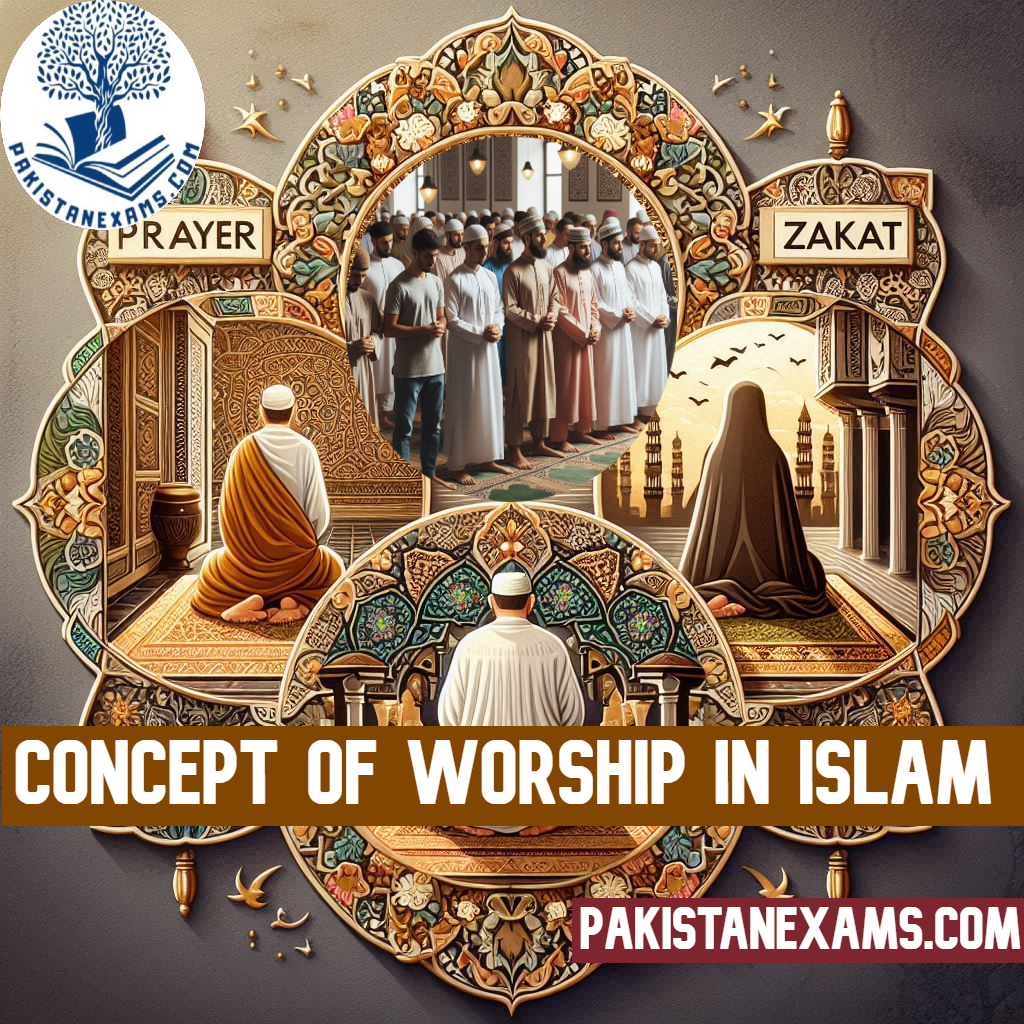Worship in Islam is very important topic for various competitive exams in Pakistan. Therefore, it is necessary for the aspirants to prepare this topic thoroughly.
Definition of Worship
In Merriam Webster worship is defined as
The feeling or expression of reverence and adoration for a deity.
The Islamic definition of worship is
Any act done with the intention of pleasing Allah Almighty. Additionally, any act was done with the intention of reverence and adoration for Allah Almighty.
Actions are dependent upon intention.
Sahi Bukhari.
Lexicology of Worship
The Arabic word Ibadah is used for worship. From this word, Abd is derived which means “servant or slave”. Moreover, the word Abid is derived from this word which means “worshiper”. Therefore, the act of putting oneself in the slavery of Allah Almighty is called Ibadah.
Need of Worship in Islam
Spiritual Need of Worship
People are always stuck in the materialistic world, so their spiritual needs are not fulfilled. Worship gives them a chance to connect to Allah and seek spirituality. This connection gives them spiritual peace and improves their well-being.
Physiological Need of Worship
It has been found that when a person offers prayer or do zikr, his health improves. Due to Zikr, he recovers from diseases like high blood pressure, panic attacks, depression, and so on. Furthermore, when a person offers his five times prayers regularly, he stretches his body, becoming healthier and stronger.
Social Need of Worship
Islamic compulsory Ibadah is the way to connect society. It brings people closer, so they become aware of issues of society. Consequently, worship in Islam gives Muslims an opportunity to discuss problems and find out their solutions, resulting in bringing harmony to society.
Emotional Need of Worship in Islam
Whenever a person is faced with a problem, he offers prayer. The reason is that Muslims believe that worship connects a person with Allah. It is a way of seeking His help. Therefore, worship gives hope to people. Allah says in the Holy Quran,
Do not be hopeless.
Purpose of Worship in Islam
Personal Grooming
Worship plays a crucial role in the personal grooming of a person. Islamic worship teaches a person humility, patience, punctuality, simplicity, and perseverance. Therefore, it improves the overall personality of a person.
Prerequisite of Worship in Islam
There are various prerequisites of worship in Islam. They are faith, will, desire, and purity. Faith is a must to worship Allah. Similarly, a Muslim has to worship Allah willingly. He does not have to worship Allah to show the world but to please Him.
Types of Worship in Islam
There are mainly two types of worship in Islam. They are formal and informal.
Formal Worship
Nimaz, Zakat, Hajj, and Zikr are formal worship in Islam.
Informal Worship
Smile, charity, obedience of parents, truthfulness, justice, halal earning, hard work, and beauty of conduct are informal worship in Islam.
Salient Features of Worship in Islam
No Intermediaries in Worship in Islam
In Islam during the worship there is not anything between man and God. The connection is direct between the two. As it is seen in Hinduism, the intermediary is a Brahmin Pandit. Similarly, in Christianity, there is Christ or Cross. It is not the case in Islam.
Worship in Islam: All Encompassing
The Islamic Ibadah are all encompassing. It means that not only the body but also soul is involved during offering prayer or zikr etc. Moreover, some Ibadah also involve money.
Intention Matters
Intention plays a significant role in Islamic Worship.
Flexible
Worship in Islam are flexible. For instance, if a Muslim is not rich he does not have to perform Hajj. Similarly, if a person sick and cannot stand he can sit and offer prayer. Hence, Islamic Ibadah are flexible.
Cross Temporal
Ibadah in Islam are the same for all the time. They do not change with the passage of time. For example, we keep fast and offer prayer exactly the way Holy Prophet PBUH practiced them.
Geographically Universal
Islam does not recognize universal boundaries. Therefore, Islamic worship is universally same. A Muslim living in Pakistan and another one living in South Africa worship exactly the same.
No Restriction and Discrimination
Rich and poor, men and women practice Islam in the same way. There is not any difference in their worship in Islam.
Allah says in Surah Adh-Dhariyat ayat 56
“And We have not created jinns and humans for any purpose other than Our Worship.”

